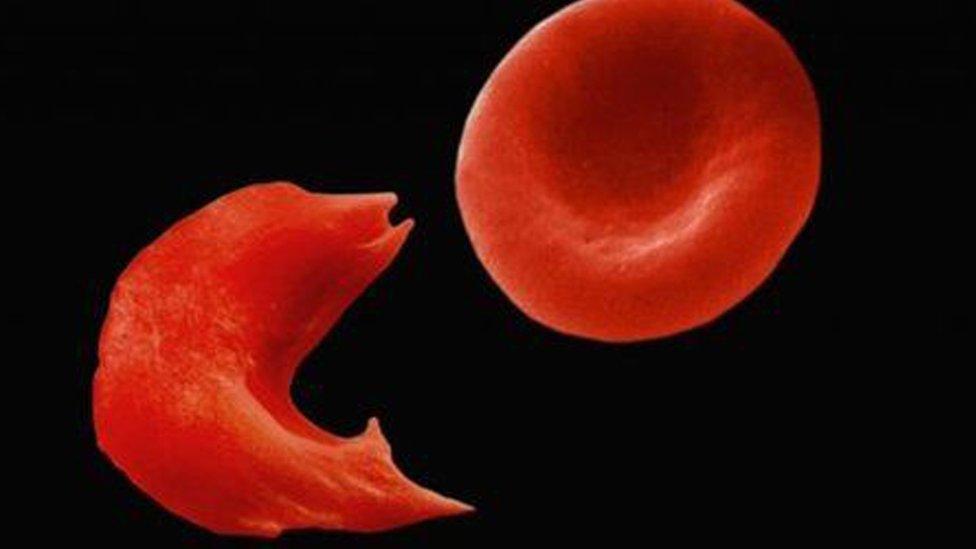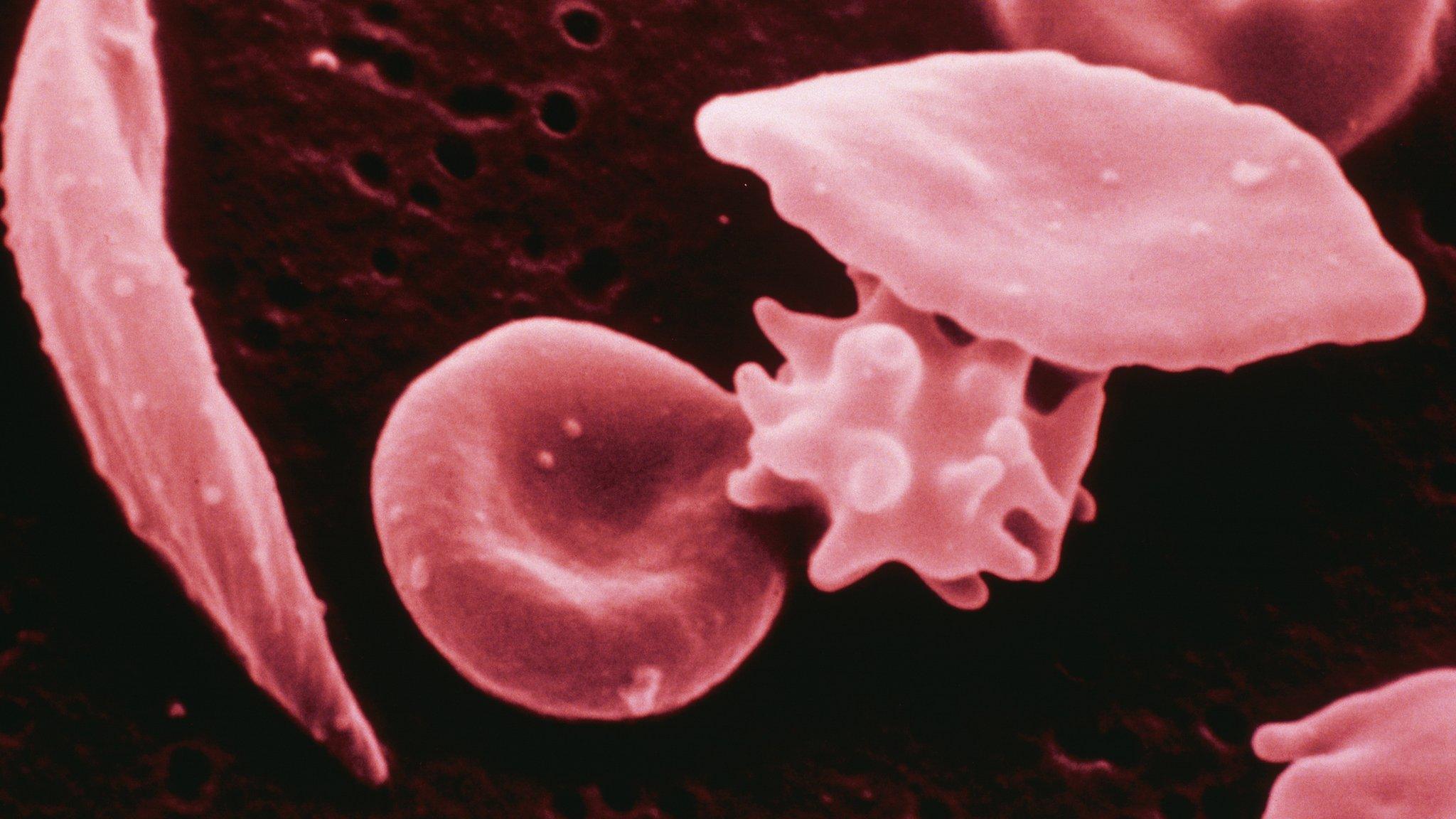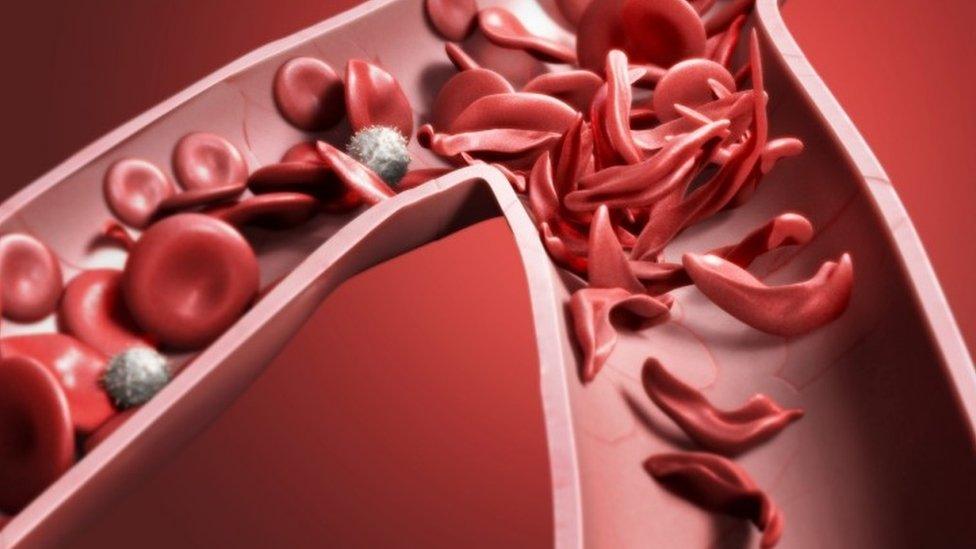Sickle cell gene therapy: 'It gives me joy and hope'
- Published

Healthy red blood cells are round, but the genetic defect makes them sickle shaped
Sia Evelyn Nyandemo, originally from Sierra Leone, runs a campaign group to support sickle cell sufferers. She spoke to the BBC's Newsday programme about caring for her daughter who has the disease and her reaction to a new treatment which could offer a possible cure to the life-threatening disease, which mostly affects people in Africa.
"Sickle Cell has taken the lives of two of our children. We have lost two girls. One of our daughters, the eldest, is living with it. And that has impacted us so much that we live with fear because of the outcome of having sickle cell.
"We know that some people will live up to a certain age but every now and then she is in crisis and we know when the child is in crisis it affects her organs."
London and Freetown 'like gold and cowry shells'
"Every time this child falls ill, we just think that this might be the day. And for the life-threatening episodes we have gone through every time she is sick or in a crisis, it is like this is and that is not a good thing for any parent to go through".
Ms Nyandemo, who lives in the British capital, London, says that her daughter is getting far better treatment than what is available to people with sickle cell in her native Sierra Leone:
"It is like comparing gold and cowry shells. In England, she is always on the antibiotics. She has to take it for the rest of her life with folic acids [used to boost red blood cells] which has helped a lot and I thank God. She has not been that patient that needs blood transfusion every now and then so we are grateful."
"But it still doesn't have a big impact because when she is ill, my heart stops because I have to go straight away to be around her because she is a single parent."
Misdiagnosed
"In Sierra Leone, I will tell you, there is nothing there for sickle cell sufferers. Our labs are not equipped to diagnose the disease. We have only one lab in Sierra Leone which is in Freetown [ the capital] at the Cottage Hospital, to diagnose sickle cell.
"Freetown is not Sierra Leone. It goes beyond that. Just imagine living with sickle cell and there are no doctors and or no oxygen in the hospitals.
"They also misdiagnose sickle cell for malaria so a lot of our children and loved ones are dying without being properly diagnosed".
'It gives me joy'
The new treatment was offered to a French teenager who has sickle cell disease.
Doctors altered the teenager's DNA in his bone marrow and 15 months on he has none of the symptoms and is no longer on any medication.
Ms Nyandemo says the development gives her hope:
"It gives joy and gives me hope that one day it will happen to our children. At last we are going to get relief. At last there is hope."
However, BBC Health Correspondent James Gallagher says that the gene therapy is an expensive procedure that can only be carried out in cutting-edge hospitals and laboratories, which is out of reach for many in Africa, where most of those affected live.

What is sickle cell disease?
Sickle cell disease is a lifelong condition caused by a faulty gene that affects how red blood cells develop
SCD mainly affects people of African, Caribbean, Middle Eastern, Eastern Mediterranean and Asian origin. But most cases are in sub-Saharan Africa
According to the US Centre for Disease Control, external, sickle cell trait is common among people who live in areas where malaria is endemic
People with sickle cell are often at an increased risk of contracting serious infections or they could become anaemic, which is when red blood cells cannot carry enough oxygen around the body. This can cause tiredness and shortness of breath
Some patients have regular blood transfusions - usually every three to four weeks - as a form of treatment for the condition.
- Published2 March 2017

- Published18 June 2016
